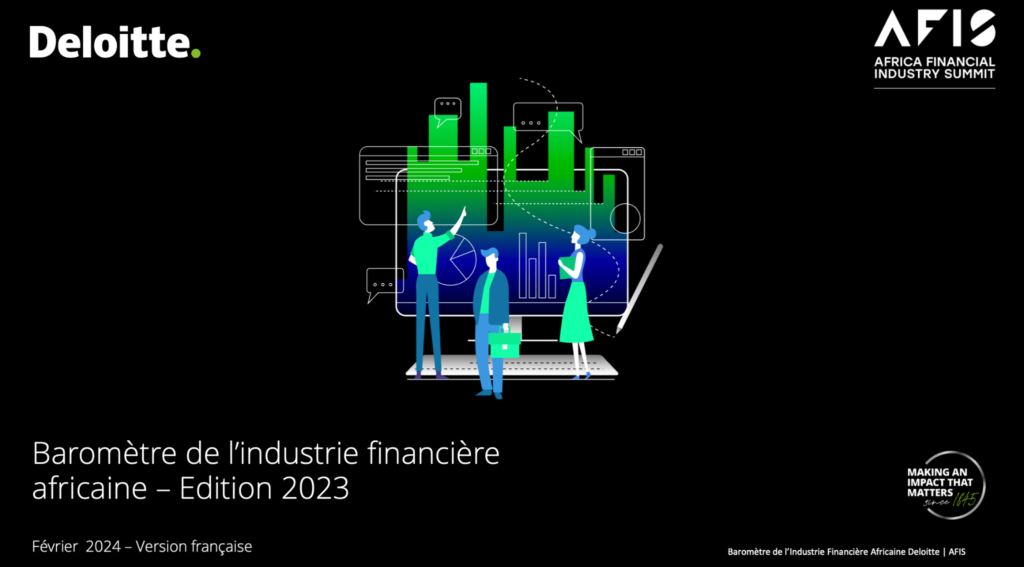African Financial Industry 2024 : “Significant progress and persistent challenges”
The third edition of the African Financial Industry Barometer was presented by the Africa Financial Industry Summit (AFIS) and Deloitte, marking a significant milestone in understanding the evolution of the financial sector on the continent.

By the editorial team
This edition, the result of an in-depth survey conducted in the second half of 2023 among around thirty leaders of financial institutions, offers a comprehensive analysis and lays the foundations for a globally renowned African financial industry.
95% of financial leaders remain optimistic about the economic outlook for the next three years
Despite the challenges posed by macroeconomic uncertainties and tensions in global financial markets, a large majority of financial leaders (95%) remain optimistic about the economic outlook for the next three years. « In response to persistent inflation, potential interest rate tightening, and tightening regulation, they continue to pay particular attention to their Asset-Liability Management (ALM), risk management (especially cybercrime and security), and capital management, » the study’s authors emphasized in a statement. « This is especially achieved through the implementation of specific and pragmatic measures (more selective distribution approach, creation of guarantee funds, and improvement of internal capital generation), sometimes at the expense of financing the real economy. »
Leaders prioritize investment in innovative information technologies
Likewise, they observe: « With a 10-point increase from the last barometer, the digital maturity of our leaders is expected to increase, driven by open banking/insuring, which remains the key catalysts for digital transformation. Leaders prioritize investment in innovative information technologies, especially in managed services, with more than one in three leaders stating that they have launched or are ready to launch migration to the Cloud. The industry also observes with vigilance and caution the evolution of artificial intelligence usage, with only 8% of executives mentioning the effective integration of this technology into their processes. »

However, challenges persist in capital markets, particularly regarding market access and depth, as well as capital management. « Liquidity and refinancing issues through capital markets persist due to levels of market access and depth deemed insufficient by 70% of leaders (compared to 56% in the previous barometer), despite an increase in transaction volume. This issue is particularly notable in currency operations and fundraising, due to strict regulations. »
Investments in green finance remain limited
Similarly, investments in green finance remain limited despite the climate emergency, requiring an acceleration towards energy transition and carbon neutrality. « Despite Africa’s annual $250 billion financing needs for climate finance, investments in green finance remain limited, with only 10% of respondents engaged in issuing green bonds. The sector must resolutely engage in energy transition, prioritizing standard green finance instruments. It must also explore realistic paths towards zero carbon objectives, as only 22% of financial institutions have a clear net zero trajectory. »
Emergence of local champions
Furthermore, the attractiveness of the African financial industry has been affected by regional political disruptions and the withdrawal of major international players in recent years. However, this has paved the way for the emergence of local champions, demonstrating the innovation and resilience of the African financial sector. « The perception of the attractiveness of the African financial industry has been significantly impacted by regional political disruptions (only 48% of respondents consider it more attractive, compared to 61% in the previous barometer), compounded by the accelerated departure of major international players over the past five years, such as Standard Chartered, BNP Paribas, or Société Générale. Nevertheless, their withdrawal has benefited some local banks, which have not only strengthened their size and geographical presence but also innovated in their business models to become true competitive continental champions on the international scale. »
It is essential for our leaders to intensify their efforts to quickly realize initiatives such as PAPSS and AfCFTA
To seize pan-African opportunities and strengthen regional integration, it is essential for leaders to intensify their efforts to realize initiatives such as PAPSS, AfCFTA, and the African Economic Leaders Program (AELP). The establishment of a harmonized pan-African prudential framework is also favored by a large majority of respondents. « Convinced at 72% that the pan-African initiative PAPSS is a major accelerator of regional integration, it is essential for our leaders to intensify their efforts to quickly realize initiatives such as PAPSS and AfCFTA, whose short-term impacts are still too weak, they recommend. The establishment of a harmonized pan-African prudential framework in terms of solvency and liquidity is also favored by 90% of respondents. »
The African financial industry is well positioned to play a leading role in the global economy
Ramatoulaye Goudiaby, AFIS director, concludes: « The third edition of the African Financial Industry Barometer highlights the significant progress and persistent challenges of the African financial industry. As the sector continues to navigate a complex global environment, this study underscores the importance of innovation, digital transformation, and regional integration in shaping a resilient and prosperous African financial future. Commitment to green finance and carbon neutrality, albeit nascent, is a positive step towards sustainable development. By capitalizing on pan-African opportunities and overcoming structural obstacles, the African financial industry is well positioned to play a leading role in the global economy. Deloitte and AFIS remain dedicated to providing key insights and supporting the development of this vital sector for Africa’s future, » added Aristide Ouattara, Deloitte Francophone Africa Financial Industry Leader.
To learn more : consult the African Financial Industry Barometer 2024






